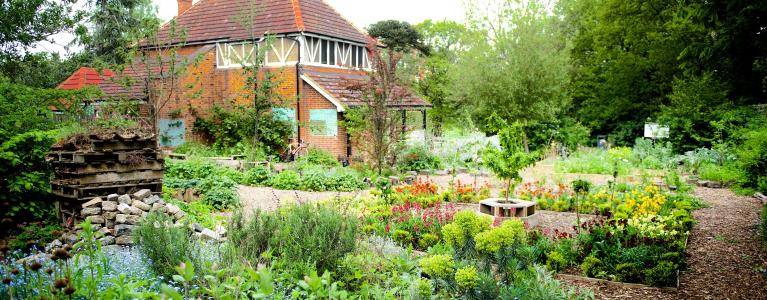
Nicola Murphy-Evans of City Hall’s environment team is interviewing the project managers of some of her favourite Pocket Parks.
The Edible Bus Stop Pocket Park
The Edible Bus Stop® was founded by Mak Gilchrist and Will Sandy. They created the first of our London Pocket Parks on an old bomb site on Landor Road, Lambeth and have followed up with a second in West Norwood.
How did Edible Bus Stop start?
Mak: I saw a planning notice to build houses on a small piece of open space near my home, and I felt compelled to protect it. So I leafleted my neighbourhood and got about 30 people to attend a meeting in a pub. When I mentioned the guerrilla gardening that had recently appeared on the site, everyone smiled. That was my ‘eureka’ moment, and I knew I wanted to make it a garden. A friend suggested I get in touch with Will; together we shared a vision that improving public space with the help of local people can really change the way a neighbourhood feels. We came up with the idea of planting edibles. Will suggested using existing transport infrastructure to link a number of gardens - the 322 bus route passes by the first garden, so we became The Edible Bus Stop®.
How did your backgrounds lead you to this kind of project?
Will: I’m a trained landscape architect. I’ve spent a lot of time researching how design can impact and empower people. I’d worked on some big private sector projects and was saddened by what little impact these spaces had on the wider community. I wanted to see what else could be done.
Mak: I come from a modelling and fashion background. However, after nearly 30 years in the business, I wanted to be a part of something that helps to make the world a better place.
Tell us about how you create your parks
Mak: We call it ‘Engage – Animate – Transform – Eat’ as this is pretty much what we do. We’ll start with the wider community, whether that be through leafleting, getting mentions in local press or blogs, and / or being present at local events. Through this, we’ll build up an email list so we can stay in touch about local projects in the future. We then work closely with the local community and ask them to tell us what they want from the space and how it should look. This is how you get people to care about the park, which is the only way to make it a success. After that, it’s the ‘form filling’ stage, working with the Mayor or the local council who provide the means to make it a reality. We then work with contractors, setting deadlines, and importantly keeping people informed as it is quite disruptive. We encourage people to take part as much or as little as they wish until we get to finished result.
You focus on edibles, what do you grow and who gets to eat?
Mak: Our first park, Landor Road has everything from corn to chard. The local community runs it and they have harvest days. People who are most involved tend to get first pick, with the rest being shared out. Our second park in West Norwood was only planted with wild and native edibles. This proved more challenging, as a lot of these plants are considered weeds!
Will: Rhubarb is always the rock star! Also strawberries, when people see them growing in an urban environment, it always makes them smile.
What have you learned since you first started?
Will: It’s important to understand your audience and tailor your ideas accordingly. That means I communicate with the council in a different way to how I communicate with local people.
Mak: Not to take things personally. I learned that you can’t please everyone all the time. Once I stopped trying it got easier.
What will The Edible Bus Stop® be doing in five years’ time?
Will: I’d like to work more closely with Transport for London to create lots of wild edible gardens across the city; not only on the 17,800 bus stops across London, but to link up the Tube and train stations too.
Mak: I’d like to be able to create jobs through our work. I’d also like to continue our work with festivals in places like the South Bank. It’s fun and playful, and a great way to engage with lots of different people.
[[{"fid":"51402","view_mode":"default","type":"media","attributes":{"height":245,"width":435,"class":"media-element file-default"}}]]
Facts and Stats
The Edible Bus Stop® have created two of our London Pocket Parks in Lambeth
Delivered in partnership with London Borough of Lambeth
Pocket Park Grant of £30,000 provided
Match funding and resource provided by LB Lambeth & The Edible Bus Stop®
Find out more about Pocket Parks
Next Interview: The Garden of Discovery, Streatham